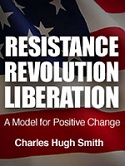

|

|
|||||||||||||
|
The Imperial Presidency (November 6, 2012) What we need is not a new president but a new presidency. There are few practical limits on presidential power. This is a key dynamic in the failed presidencies of G.W. Bush and Barack Obama. If you're not familiar with the term The Imperial Presidency, here is an introduction:
Through various means, Presidents subsequently acquired powers beyond the limits of the Constitution. The daily accountability of the President to the Congress, the courts, the press and the people has been replaced by an accountability of once each four years during an election. These changes have occurred slowly over the centuries so that that which appears normal differs greatly from what was the original state of America. Historian Arthur M. Schlesinger, Jr. popularized the term with his book The Imperial Presidency (Kindle edition), originally issued in 1973 but updated in 2004 to include a discussion of the G.W. Bush presidency. Schlesinger summarized the "World War II and beyond" expansion of presidential powers thusly:
“The weight of messianic globalism was indeed proving too much for the American Constitution. If this policy were vital to American survival, then a way would have to be found to make it constitutional; perhaps the Constitution itself would have to be revised. In fact, the policy of indiscriminate global intervention, far from strengthening American security, seemed rather to weaken it by involving the United States in remote, costly and mysterious wars, fought in ways that shamed the nation before the world. In general, the Constitution grants the Executive Branch few outright powers. The president is given extraordinary powers in wartime as Commander-in-Chief of the Armed Forces, and he is given broad leeway to pursue foreign policy. Presidents have long "mixed and matched" the two, sending U.S. troops and Naval forces to intervene in other nations to suit U.S. policy objectives. President Lincoln exceeded constitutionally granted powers during the Civil War but claimed the integrity of the nation was higher priority than obeying the Constitution. The expansion of "war powers" to times when war had not been declared by Congress began in earnest with President Franklin Roosevelt, who invoked "emergency powers" before war was declared in December, 1941. After World War II, presidents engaged the nation in full-blown wars in Korea and Vietnam without Congressional declarations of war. A "green light" of congressional approval for whatever actions the president deems necessary was put in place after the Watergate scandal. Events since then (such as the invasion of Iraq in 2003) have revealed how far an Imperial President could go with broadly granted war powers, "presidential immunity," "signing statements" (declaring which congressionally approved statutes he would ignore or refuse to enforce) and the increasingly popular "executive orders" which enable everything from imprisoning entire ethnic populations (E.O. 9066) to claiming extra-legal powers over the entire U.S. economy. Presidents before G.W. Bush and Obama managed to perform their duties with a handful of Executive Orders--five per term seemed about average. President Bush issued 160 in his first term while President Obama has so far issued 139. Both of our most recent presidents also made heavy use of Executive privileges such as "signing statements" and other "work-arounds" to feeble limits on presidential powers: Obama’s Executive Orders (factcheck.org). Imperial Presidency 101 - Unitary Executive Theory and the Imperial Presidency Candidates Agree: Imperial Presidency Is A-OK The implicit claim by defenders of essentially unlimited presidential power is that these broad powers are needed to run the American Empire. No Establishment figure would dare openly state that the U.S. operates a military, diplomatic, financial and commercial Empire, but that is nonetheless the case being made to justify the Imperial Presidency: an Empire requires an Imperial President with broad powers to act not just in the domestic economy and society but anywhere in the world.
What we need is not a new president but a new presidency. Unfortunately neither
candidate has expressed any interest in limiting the powers of the Imperial Presidency.
If the history of the past two (failed) presidencies is any guide, Imperial powers
will only expand as crises offer new opportunities for extra-legal power grabs.




Please click on a book cover to read sample chapters
NOTE: gifts/contributions are acknowledged in the order received. Your name and email remain confidential and will not be given to any other individual, company or agency.
"This guy is THE leading visionary on reality.
He routinely discusses things which no one else has talked about, yet,
turn out to be quite relevant months later."
Or send him coins, stamps or quatloos via mail--please request P.O. Box address. Subscribers ($5/mo) and contributors of $50 or more this year will receive a weekly email of exclusive (though not necessarily coherent) musings and amusings. At readers' request, there is also a $10/month option. What subscribers are saying about the Musings (Musings samples here): The "unsubscribe" link is for when you find the usual drivel here insufferable.
All content, HTML coding, format design, design elements and images copyright © 2012 Charles Hugh Smith, All rights reserved in all media, unless otherwise credited or noted. I am honored if you link to this essay, or print a copy for your own use.
Terms of Service:
|
Add oftwominds.com |